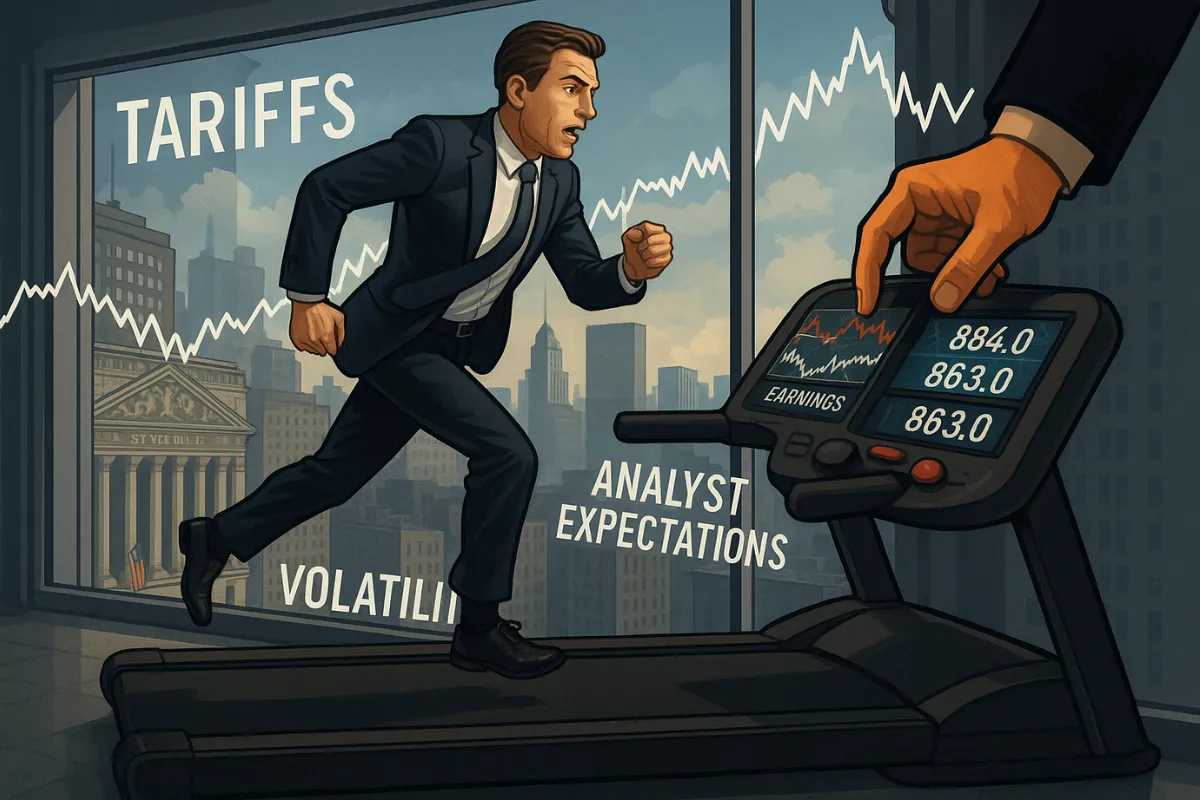BLOG

When Great is Not Good Enough
Since the inauguration of President Trump, investors have been very nervous about his administration’s aggressive policy changes and process. He and his administration seem to be keeping Wall Street and Main Street on a “need to know” basis that is hard for business owners to plan their future.
After two consecutive robust years of stock market gains in 2023 and 2024, investor expectations of a three-peat of 20% annual index gains are proving unrealistic. Investors expect annual growth of corporate top-line revenue (gross sales) and earnings EBITDA (earnings before interest, taxes, depreciation, and amortization) to continue at an unprecedented pace that is unattainable and unsustainable. That of course leads to disappointment and subsequent selling of stocks when investors’ expectations are not met.
You will notice with most “earnings calls” by management that their announcements are compared to “expected”. The “expected” is what analysts, not employed by the company and without inside information, offer their opinion of what they believe the company growth should be. These analysts’ forecasts somehow become the new standard for the company with little regard to what the company publicly forecasted in the prior quarter.
Smart CEOs and their executives simply report the facts with few references to future expectations to somehow keep expectations realistic. For more enthusiastic CEOs, like Elon Musk who like to pontificate on hopes and dreams, the delta of expectations vs actual can be very wide resulting in massive stock price swings.
This game of analyst’s expectations vs actual has always seemed to me a fool’s game. Typically, the better a company is performing the higher the analysts raise the bar until meeting these growth expectations is unrealistic.
Unfortunately, this puts strong growth companies in a lose-lose situation. Investors are not impressed if the company simply meets analyst’s expectations. However, when companies do not meet Wall Street’s analysts’ expectations the results are disappointing investors and typically selling the stock.
A recent example is Palantir (PLTR). Yesterday after the market closed Alex Karp, Palantir CEO, announced their Q1 financial reports. Below is what CNBC reported:
Earnings per share: 13 cents adjusted vs. 13 cents expected
Revenue: $884 million vs. $863 million expected
“The defense technology company said that its commercial revenues grew 71% from a year ago to $255 million, while its government segment sales jumped 45% to $373 million. The company is forecasting that U.S. commercial revenues will top $1.178 billion this year.
Karp attributed Palantir’s government sector growth to greater U.S. defense sector adoption of its tools. He said that demand for large language models and the software supporting it has “turned into a stampede” and “ravenous whirlwind of adoption.”
Palantir’s revenues grew 39% from $634.3 million in the year-ago period. Net income rose to about $214 million, or 8 cents per share, from roughly $105.5 million, or 4 cents per share, in the year-ago quarter. U.S revenues jumped 55% to $628 million, Palantir said.”
One would think investors would celebrate a company that increased revenue by 71% year over year (YoY) and for its CEO to report that demand for their products has “turned into a stampede”.
Not so. Great is not good enough.
Yesterday investors started selling overnight futures contracts after the announcements and PLTR stock opened this morning down --8.57 %. For the past year and through today, investors have been driving up PLTR stock price which has increased 362% through today. This year PLTR has been one of the top S&P 500 performing stocks increasing 43.26% even after today’s selloff. We began adding PLTR to our growth model portfolios in early January this year and will determine if this selloff is another potential buying opportunity.

This same investor attitude that “great is not good enough” has permeated other areas of the US economy and stock market. Investors were disappointed with Q4 US Gross Domestic Product (GDP) only increasing 2.5% YoY. This pace has extended the positive trend since 2015. According to official data by the World Bank, the US represents 26.29% of the world economy.

Yesterday, the Institute of Supply Management (ISM) released its monthly report ISM Services report that unexpectedly beat analysts’ forecasts jumping to 51.6 and the 10th consecutive monthly increase. According to the Federal Bureau of Economic Analysis, the US is the world's largest exporter of services, with more than US$1 trillion in value in 2023. Also, President Trump’s tariffs do not apply to US services.

Scott Anderson, Ph.D., BMO chief U.S. economist and managing director observed the following:
“This was a somewhat better ISM Services report than we expected,”. “With that said, the negative impact on services activity and inflation from the tariffs and government spending cuts are very real and already beginning to materialize.” Higher prices, lower business activity, and employment cuts will impact the sector without a pivot on tariffs, he added.
Among the Services report’s bright spots: The Business Activity Index was at its lowest level since June 2024 (50.2 percent), but the reading of 53.7 percent — a decrease of 2.2 percentage points compared to March — is good by any standard. And amid concerns of a travel boycott from Canada and European nations, the Accommodation & Food Services (A&FS) industry had a strong April.”
However, tariffs and surprises from the Trump administration are causing concerns among corporate executives. Steve Miller, CPSM, CSCP, Chair of the Institute for Supply Management® (ISM®) Services Business Survey Committee, stated during a conference call for reporters on Monday:
“There was a lot of commentary regarding decision-making and planning difficulties around potential tariff impacts,” he said. “After the additional inventory ordering (in recent months), there’s been a pause until people see how the tariffs actually shake out.”
Miller continued, “You’re seeing that on the manufacturing side, and many companies in the services industry are holding off on making additional commitments while they work through their inventory and see how tariffs land.”
For investors, these events that create stock volatility can be buying opportunities for good-performing companies for long-term investors.
What Does This Mean to Me?
Many readers have shared with us their concerns about this administration and especially President Trump’s seemingly erratic means of decision-making. Certainly, past reports on the economy and stocks are not indicative of the future. The high level of frustration, uncertainty, and confusion that existed in April seems to be abating as more information is released from Washington. Institutional investors also seem to be more comfortable with forecasts of continued moderate growth for the US economy and stock market. However, uncertainty about the future of tariffs and corporate costs still exists in many financial markets.
The major indices have all recovered 50% or more from the YTD bottom reached on April 8 when investors stampeded to the exits after Trump’s tariff announcement from the White House.

Our view is if President Trump can navigate through the tariff issues and the economy remains in a moderate growth trend, institutional investors will continue the stock buying trend pushing up the major indices. Many of the companies with strong growth trends especially in the tech sector are still well below their former high stock prices reached in February. Investors are cautiously reinvesting and barring any new surprises out of Washington, the stock market may continue to recover.
However, this is a big assumption. As mentioned last week, President Trump has made a living keeping people on edge with surprising announcements. However, more evidence is mounting that Trump does care about Wall Street and their investors including millions of employees with trillions invested in retirement plans.
Let us know what’s on your mind. We welcome your thoughts and opinions. Also, contact us for a no-cost review of your financial situation and ways our firm can assist you and your family achieve your goals.
CONTACT
Check the background of your financial professional on FINRA's BrokerCheck.
The content is developed from sources believed to be providing accurate information. The information in this material is not intended as tax or legal advice. Please consult legal or tax professionals for specific information regarding your individual situation. The opinions expressed and material provided are for general information, and should not be considered a solicitation for the purchase or sale of any security.
We take protecting your data and privacy very seriously. As of January 1, 2020 the California Consumer Privacy Act (CCPA) suggests the following link as an extra measure to safeguard your data: Do not sell my personal information.
The information on this website is the opinion of Up Capital Management and does not constitute investment advice or an offer to invest or to provide management services. Before purchasing any investment, a prospective investor should consult with its own investment, accounting, legal, and tax advisers to evaluate independently the risks, consequences, and suitability of any investment.
Copyright 2024 | Privacy Policy | Terms & Conditions

